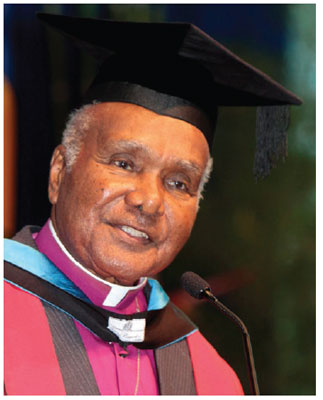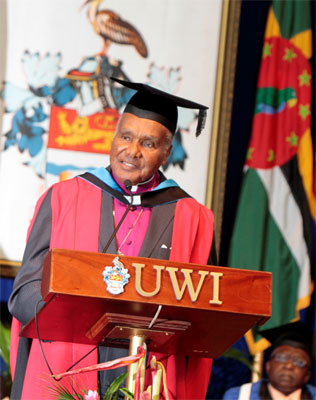 |
 |
 |
|
December 2013 |
First let me express my deep appreciation of the honour conferred on me this evening. I am filled with both a sense of pride, as well as a tremendous feeling of humility in being selected for such an award. To say that this is the most prized of all the awards that I have received is no over-statement, especially since the community of which I am now a part, is regional in its genesis and international in its influence. There is perhaps, one more piece that adds to my sense of pleasure this evening, Chancellor, in which I ask your indulgence to mention at this time. It is that I have now joined my three sons, two daughters-in law, three nieces, one nephew, and as of yesterday, one grand-daughter, a total of 10 members of my family and myself, making eleven, who are now graduates of this University. In selecting what I would like to share with my fellow graduands this evening, I have gone back in history because we so frequently fulfil the prophecy of Santayana in the 19th century in Madrid who said that those who fail to learn the lessons of history, are doomed to repeat them. And so I recall the experience of Esther, Queen in the ancient city of Susa, sometime in the 6th century, BC. Susa was part of the Persian Empire, located in what is now Khurestan Province, and Esther, a young Jewish girl, whose parents were killed in the sack of Jerusalem by Nebuchadnezzar, King of Babylon, was adopted by her uncle Mordecai. They were among the hundreds taken as slaves in the Babylonian captivity of the Jews at that time. I pick up the story at the point where Ahasuerus (King of Susa) had divorced his first wife Vashti, because she refused to join the very lavish palace party and show off her beauty to please the King and his courtiers, who were almost drunk with wine. The King now had to find a new Queen, and for this, a beauty competition was held, and Esther, one of the competitors was chosen by the King to be his new wife. He did not know that she was Jewish. One night, the King could not sleep so he called for the royal scribe to read from the records of his reign. Part of the reading told of the attempted palace coup which failed because Mordecai revealed the plot to the King. The King asked: “Was anything done to reward Mordecai?” “No,” said the scribe. “Well then, is there anyone around in the palace?” It happened that Haman, the King’s secretary of State was still in the palace; so he was summoned and asked by the King: ‘What should be done to the man whom the King delights to honour?” Haman, who was ambitious as well as conceited, thought that he was the one, so he replied that such a person should be mounted on the King’s horse, be clothed in the King’s royal robes and led through the city while the crowd cheered. The King then told Haman that he should do exactly as he had said to the Jew Mordecai, and that nothing be left out. Haman was mortified. Mordecai was the one person Haman hated most, but the next day he had to do what the King commanded. To add fuel to the fire, Haman had previously surreptitiously arranged to have the King issue a decree to have all the Jews in the province exterminated on a day not too far off. Mordecai on learning of the King’s decree sent a copy to Queen Esther, for she did not know of Haman’s evil intent against the Jews, warning her that she would not escape. The decree threw the whole city and the province in confusion for the charges against the Jews, brought by Haman to the King were all false. Mordecai also raised this question for Esther’s reflection: “Who knows? Perhaps you have come to royal dignity for just such a time as this.’’ Esther then asked Mordecai to get all the Jews to join her and her maids in fasting and prayer for three days that she may be guided in her response, which turned out as follows. Esther gave two private banquets for the King and Haman. During the second banquet, the King asked Esther what was her petition and request, for he sensed that there was something bothering her. Esther then asked that her life be spared and those of her people. The King asked: Who would presume to do this?
The King, very upset, left the banquet table and went into the garden to think. When he returned he found Haman on the couch where Esther was reclining pleading for his life. Angry at the sight, the King said: “Will you even assault the queen in my presence and in my own house?” At this moment, one of the king’s eunuchs told the King: “Look the very gallows that Haman prepared for Mordecai who saved the King’s life, stands at Haman’s house.” “Hang him on that,” said the King. So said, so done. What a story! What great lessons there are for all of us when we focus on Mordecai’s challenge to his niece, Esther! “Who knows? Perhaps you have come (to this) dignity for just such a time as this!” In the Providence of God you and I have come to a new dignity in the West Indian society, and like Esther there will be times when each of us will have to face a similar challenge. Who knows if you have not been so placed to act at just such a time as this? We are all aware of the crises facing this and other Caribbean nations which this University serves. Graduates! You have not been given this new dignity to enable you to escape or hide from the realities which surround us all, and which cry out for solutions which your new dignity has prepared you. The call is directed to you to exercise your gifts that will turn the darkness of the night into a new dawn of tomorrow. I urge you learn from Queen Esther! She did not rush into the fray like the proverbial bull in a china shop. She very carefully weighed the possible consequences of her options, and she asked for, and received the support of her Jewish community, in seeking God’s guidance. \ But Esther went even further. She embraced the absurdities in the sure knowledge that the ultimate result, which could be death, was not her decision to make, for she knew for certain that God’s grace would, in time, be factored into the equation. In going forward, remember that like Esther, you do not stand alone. You belong to a large community which expects you to bring lustre to its already noble record of service. The gains must not be lost. Expect more of yourself, and by all means have dreams! Dreams that will make the impossible become possible. For, far too often we fall into the excuse mode which successfully creates the largest sinkhole for progress, and already there are far too many victims therein. Indeed, making excuses in our Caribbean society has become endemic, and therefore a disease. I urge you therefore do not take that route; it leads only to disaster as Mordecai warned Esther. Instead, as Esther discovered her purpose in life, not at the beginning, but as she lived it out; which has been my own experience, and that of the majority of people. And so Esther lived her life in the context of Mordecai’s challenge which I invite you to make your own: “Who knows? Perhaps you have come to (this) dignity (precisely) for such a time as this in our history as citizens of this nation and as people of the Caribbean.” Chancellor, very distinguished Ladies and Gentlemen, Graduands, I thank you for your kind attention and bid you God’s speed on your continuing journey. This is the address given to graduates of the Faculty of Social Sciences, UWI, St Augustine, on October 25, 2013.
|




 Esther replied: “A foe and an enemy, this wicked Haman.”
Esther replied: “A foe and an enemy, this wicked Haman.” 